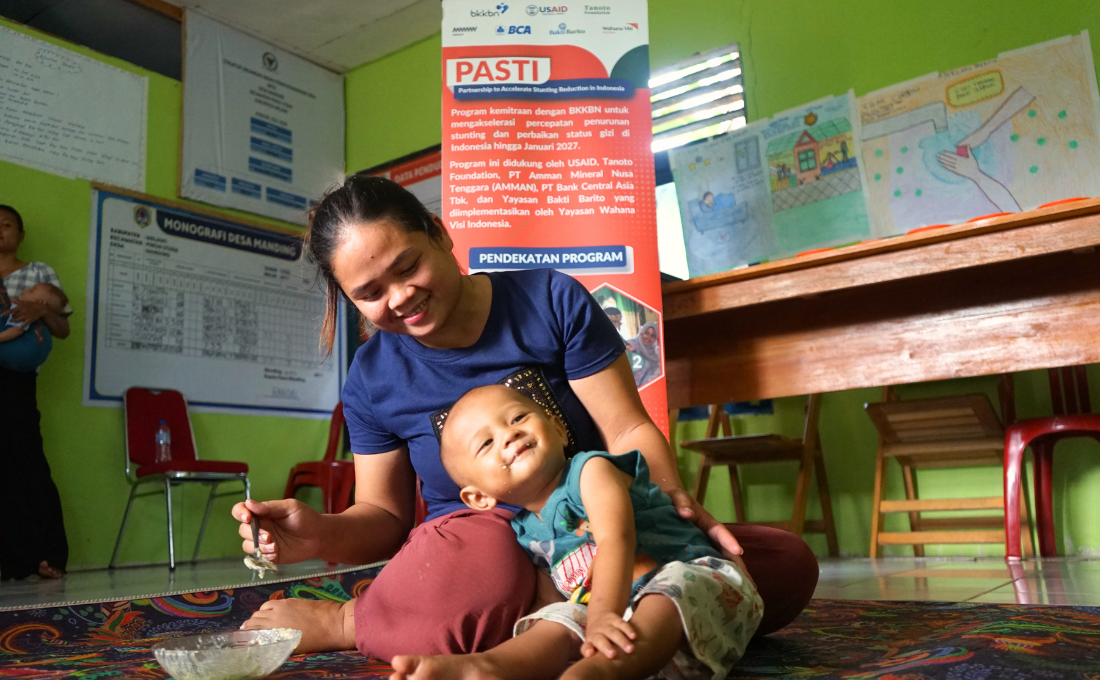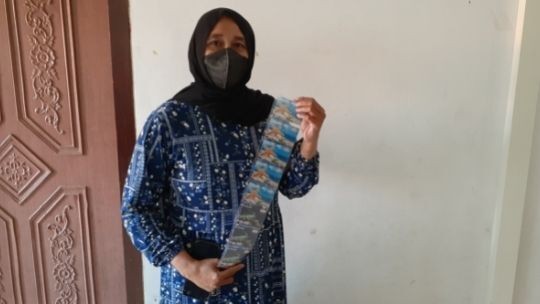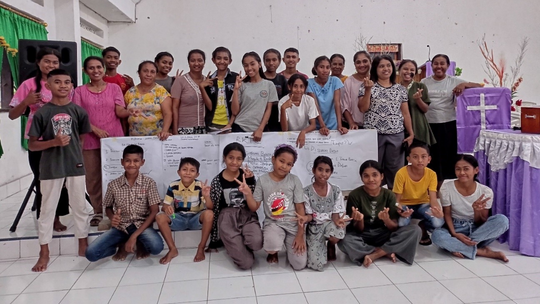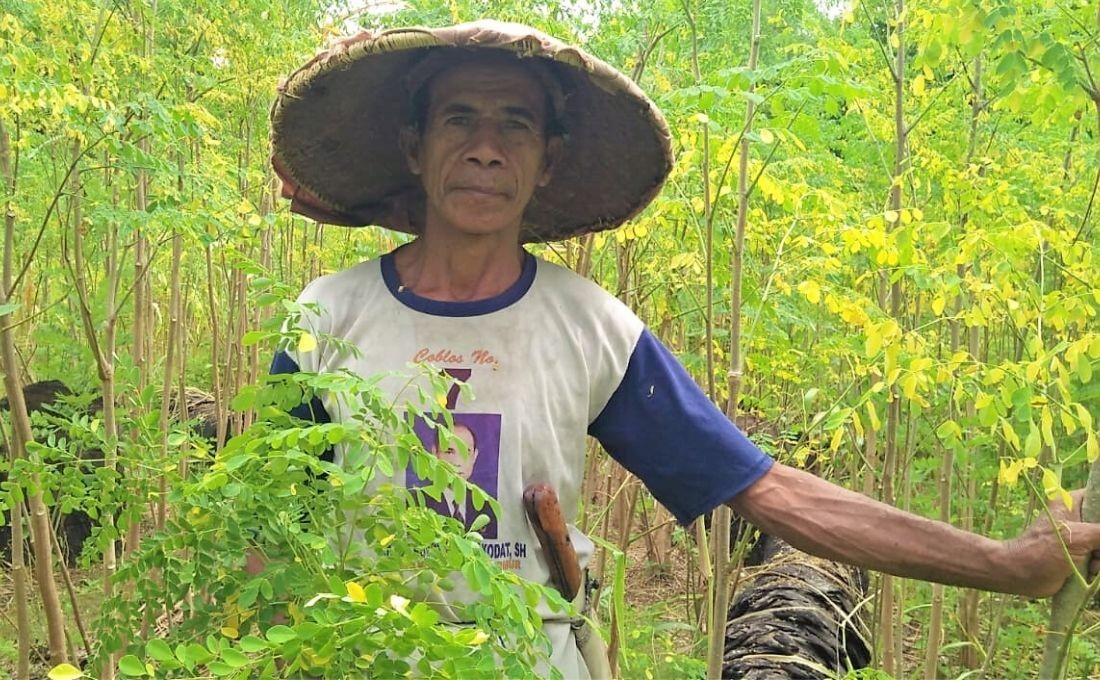Pumpkin Chicken Porridge: A Local Menu Creation from Melawi to Prevent Stunting

Inadequate nutrition and limited knowledge in parenting are key factors contributing to stunting. Maria (52), a leader of the Family Welfare and Empowerment Organization (PKK) team in a village participating in the Partnership to Accelerate Stunting Reduction in Indonesia (PASTI) program in Melawi Regency, Kalimantan Barat, shared, "Parents often don't understand the nutritional value of the ingredients they feed their children. Their main concern is simply filling their child's stomach," she explained. Marieta (27), another PKK cadre, echoed this sentiment, adding, "In our village, parents often feed children only rice mixed with used cooking oil, thinking it’s just as nutritious as fried rice," she added.
This issue has become the main focus of the PASTI program, a partnership between the Ministry of Population and Family Development/BKKBN, the United States Agency for International Development (USAID), Tanoto Foundation, PT Amman Mineral Nusa Tenggara (AMMAN), PT Bank Central Asia Tbk, and Bakti Barito Foundation. The program, implemented by Wahana Visi Indonesia and Yayasan Cipta, aims to accelerate efforts to reduce stunting in Indonesia.
One of PASTI's key approaches is Pos Gizi DASHAT (PGD), an integrated nutrition intervention based on local context and behavior change communication targeting families with children under-two at risk of stunting. PGD combines two community-based interventions: Pos Gizi and DASHAT. Pos Gizi provides nutrient-dense supplemental feeding using local foods for children under-two, alongside education on optimal feeding, hygiene, and parental outreach for health services, conducted intensively over a 12-day period. This intervention focuses on children identified at Posyandu (2T) as underweight without recent weight gain but not currently ill. DASHAT, on the other hand, empowers communities by promoting balanced nutrition for families at risk of stunting. It leverages local resources to educate and instill healthy family eating habits. Children under-two with an underweight nutritional status or those who have not gained weight after two consecutive weigh-ins (2T) will transition to the DASHAT program after completing the 12-day Pos Gizi class. The DASHAT program includes 90 days of monitoring, with weekly educational sessions. Children who have experienced a single instance of no weight gain (1T) can also join the DASHAT classes. Throughout the program, the child's weight will be monitored every 30 days by volunteers and cadres during Posyandu activities. The integration of Pos Gizi and DASHAT forms a holistic community model focused on stunting prevention, designed to reach over 1.000 HPK families.
Based on the PASTI monitoring results from January to October 2024, approximately 1,450 (65%) of PGD participants in the PGD program showed a weight gain of at least 200 grams over the 12-day period. The PGD leverages locally available, nutritious foods, providing a simple and affordable solution for daily use, so that these good practices can be continued by the community even after the program ends.
Maria shared that, as a PKK cadre, she is actively involved in the PGD activities in her village. "I have learned how important it is to design a feeding program with nutrient-dense and varied menus," she said.
One of the staple dishes in their village is pumpkin chicken porridge. Pumpkin is a widely available and commonly consumed ingredient in Melawi, including in Maria's village. "We usually cook pumpkin as a vegetable or even make dodol from it," Maria explained.
The selection of the pumpkin dish is not arbitrary. Using the Positive Deviance (PD) approach, the menu in the PGD intervention is based on the good feeding and caregiving practices of low-income families who, despite their circumstances, have children under-two with good nutritional status.
Maria mentioned that some local residents, who have home gardens, intentionally plant pumpkins for daily consumption. The estimated cost to produce one serving of nutritious local food, providing 600 calories and weighing 250 grams, is around IDR 10,000 to IDR 15,000.
Of course, pumpkin is not the only ingredient in the PGD menu. Pumpkin Chicken Porridge also includes other ingredients such as rice, chicken eggs, chicken meat, chicken liver, dried soybeans, and cassava leaves. These ingredients are carefully selected to ensure the meal provides all the essential nutrients needed. All the ingredients are mashed and blended to achieve a texture suitable for children under-two.
Tia (30), one of the parents of PGD participants, shared her thoughts on the Pumpkin Chicken Porridge menu. She mentioned that her son, William, really enjoys the dish. By the 12th day of the PGD program, William had gained 400 grams. "Out of all the menus served at PGD, William always finishes the pumpkin chicken porridge," she said with a big smile.
Tia also feels she has gained many benefits from this program. She now has reference for nutrient-dense meals that are easy to prepare at home. "The menus taught are very practical, and I can substitute ingredients like corn," she shared. Tia hopes her youngest child will experience significant weight gain. "Parents always hope their children grow up healthy," she concluded.
Author: A. Adintyo (Communications Officer for PASTI program)



